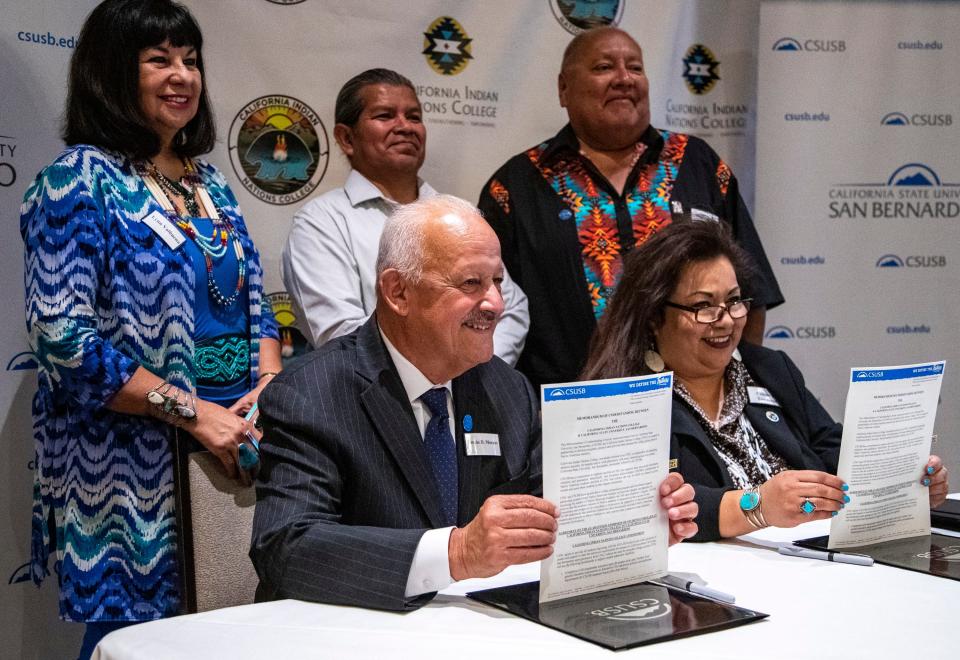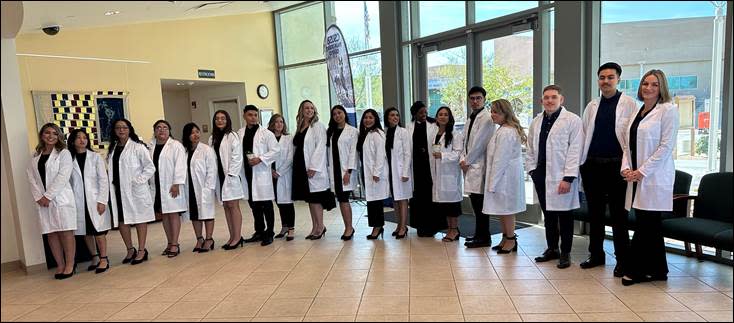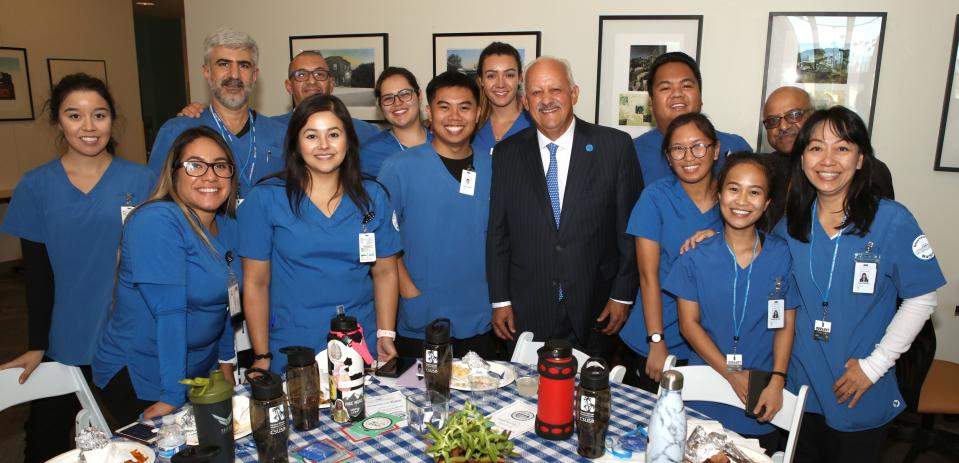Update: CSU faculty reach tentative agreement, ending historic systemwide strike
Update: The faculty union of the California State University system reached a tentative agreement on Monday, Jan. 22 and will end its strike after one day — ending the first systemwide faculty strike at the largest public university system in the United States.
Faculty are expected to return to work on Tuesday, Jan. 23. Students are advised to check for instructions from their instructors regarding potential adjustments to their classes. CSU said it encourages faculty to be "flexible and understanding of individual circumstances" if students have difficulty returning to campus.
"Our hard-earned [tentative agreement] reflects the solidarity displayed by faculty, staff and students across all 23 campuses," the faculty union said in its statement.
While the tentative agreement still needs to be ratified by members of the California Faculty Association, further details will be provided in the coming days. Highlights of the agreement, according to an update posted on the CFA website, include:
5% general salary Increase for all faculty retroactive to July 1, 2023;
5% general salary increase for all faculty on July 1, 2024 (contingent on the state not reducing base funding to the CSU);
Raising the salary floor for [the] lowest-paid faculty in salary;
Salary step increase of 2.65% for 2024-2025 [academic year];
Increasing paid parental leave from six to 10 weeks;
Increasing protection for faculty who have dealings with police by providing for a union rep in those interactions;
Improving access to gender-inclusive restrooms and lactation spaces, and a pathway to monitor issues of access;
Providing support for lecturer engagement in service work;
Extending the current contract for 2022-2024 one year to June 30, 2025.
The faculty union of the California State University system plans to hold a week-long strike across the 23 campuses, including CSU San Bernardino's Palm Desert Campus, from Jan. 22-26 — the first ever systemwide strike by faculty.
The strike also coincides with the first week of instruction for the spring semester throughout the state.
Here's what you need to know.
Why have CSU faculty called for a strike?
The California Faculty Association — a union that represents about 29,000 professors, lecturers, coaches, librarians and counselors — are seeking higher wages and improved benefits, including a more manageable workload, gender-inclusive restrooms, safe and clean lactation rooms for new parents, safety provisions for faculty interacting with university police, a full semester of paid parental leave and reasonable counselor-to-student ratios to improve students' access to mental health services.
In a statement, the CFA said it called the strike after a bargaining session on Jan. 9 after administrators ended contract negotiations and presented "a last, best and final offer" of 5% general salary raises to faculty members effective Jan. 31, 2024; the union is seeking 12% pay increases to keep up with inflation and lift the minimum wages for its lowest-paid instructors.
"We've got a lot of lecturers who I know who have to string together course assignments across multiple institutions to make ends meet," said Thomas Corrigan, a professor of communications at CSU San Bernardino. "To me, it's one of the best illustrations in which faculty working conditions are student learning conditions, because you can't teach good classes if you are running around with six to seven courses across multiple schools."

Cal State has argued that is cannot afford the wage increases and that its total costs far exceed how much it brings in from tuition and state taxpayer revenue — even after approving to raise tuition annually for the next five years.
During a virtual media briefing held on Friday, Jan. 19, CSU's Chancellor Mildred García said "unquestionably (faculty) deserve an increase ... but we are and must be equally committed to the long-term stability and success of the CSU, which means we must be fiscally prudent."
Leora Freedman, CSU's vice chancellor for human resources, said if they were to agree to the increases that the unions are requesting, "we would have to make severe cuts to programs, we would have to lay off employees," she said. "This would jeopardize our educational mission and cause hardship to many employees."
Officials also addressed CFA's claim that the CSU would not need to dip into its reserves to pay the salaries that the union seeks. Steve Relyea, who serves as CSU's executive vice chancellor and chief financial officer, said that the analysis provided to the union is incorrect.
"Let me just boil it down this way. That number, that $8.6 billion number (in reserves), is the total one-time cash that is flowing through the system," he said, "but about $7.8 billion, the lion's share of that ... is tied up in firm obligations and (critical) commitments. A lot of it is protected by state law."
When asked to further clarify, Relyea maintained that the "one-time dollars" are used for "financial aid, returning money to the state, contractual obligations, all these things, debt service on buildings, we have to pay that stuff," he said, adding that good stewardship would ensure that students "get a quality education at a reasonable cost."
Corrigan, who is in his 11th year teaching at CSUSB, said most students live and work in the Inland Empire after graduating. It's a huge impact in terms of economic and civil progress, he said. He sees CSUSB as the "people's university."
"At every commencement when the president asks every graduating student (to rise) if they're the first in their family to earn a college degree. And it's just a sea of students, right? It's really special (and it gives) me goosebumps," he said. "The trouble from my perspective is that promise of a quality (and) affordable public education for working-class students — and increasingly students of color — is being undermined."
He noted that the cumulative 34% tuition raise will make it difficult for students to attain a CSU degree — particularly those who are supporting not only themselves, but family members.
"We have always been against tuition hikes," said Rong Chen, professor emeritus at CSUSB.
Teamsters Local 2010 — a union that represents electricians, painters, plumbers and other skilled trades workers at 22 of the 23 CSU campuses — had planned to join the CFA during the strike. However, since reaching a tentative agreement for a three-year contract on Friday, Jan. 19, they will no longer be on strike at CSU this week, according to an update posted on the Teamsters' website.

How will this impact the CSU San Bernardino Palm Desert Campus?
While students are met with a banner on the CSU website that notes campus will be "open and fully operational during labor union strikes," students should keep in mind that educators will be withholding their labor, which includes all in-person and virtual work. In other words, they will not be grading, holding office hours or answering work emails.
"I want to be clear that we're working hard to make sure that students understand what's going on," Corrigan said. "We are also working hard to let them know that we didn't do this. We wanted to continue negotiating. At this point, there aren't steps left other than to withhold our labor until they give us the contract we deserve."
If students have classes scheduled on Saturday, Jan. 20, they can expect those to not be impacted, said Chen.
In the meantime, CSUSB faculty at the Palm Desert campus have planned to organize a demonstration from 10 a.m. to 1 p.m. on Tuesday, Jan. 23. A strike line and information table will be held at the Cook Street entrance of the campus.
At Friday's media briefing, Freedman also addressed "some misinformation that has been circulating" with regards to ensuring that "all CSU campuses will be open and operational during the time of the planned strike," including "libraries, food services, student unions, academic advising, financial aid advising, resource centers, resident halls and gymnasiums."
Any changes to hours of availability, she said, will be posted online. Freedman added that if students go to campus, they should expect picket lines and traffic delays. Both CSU and CFA's websites have included FAQ sections about the strike, where they state that the work stoppage will not impede on a students' ability to graduate on time. CSUSB's faculty union also shares updates on its Instagram.

A class cancellation report was also released by the CSU system, in which students were asked to share which of their classes have been canceled and the faculty member teaching their section. Students have also taken to online forums, such as Reddit and various Instagram accounts, to share false submissions of canceled classes — "engendering more solidarity," Corrigan said.
"One thing that's important to know is that students are not responsible for taking attendance for management," Corrigan said. "The idea of having students operate, for a lack of a better term, as snitches to identify faculty who are participating in the strike is really an effort to weaken our union resolve and create an atmosphere of fear. They're pretty easily seen through by both faculty and students."
At the media briefing, Alexcia Negrete, the editor-in-chief of The Daily Titan — Cal State Fullerton's student-run newspaper — asked CSU officials to clarify how that information from the report would be used.
"The information will be used to gauge the impacts and how our students have been impacted by the strike," said Christina Checel, CSU's associate vice chancellor of labor and employee relations. "It's not the only thing that we'll be looking at, but it is one way where we can allow students who want to share information to do so."
Jennifer Cortez covers education in the Coachella Valley. Reach her at jennifer.cortez@desertsun.com.
This article originally appeared on Palm Springs Desert Sun: Update: CSU reach tentative agreement; will end systemwide strike

